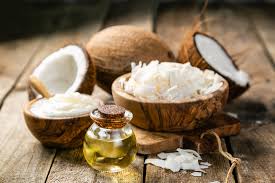Introduction
MCT oil has gained significant popularity in recent years, especially in the health and wellness community. One of the most common ways to incorporate MCT oil into a daily routine is by adding it to coffee. If you’ve been wondering whether you should start using MCT oil in your morning cup, you’re in the right place. This article will take an in-depth look at why MCT oil in coffee is a growing trend, its potential health benefits, and how you can best incorporate it into your routine.
1. What is MCT Oil?
Before diving into why you should use MCT oil in your coffee, it’s essential to understand what MCT oil actually is. MCT stands for medium-chain triglycerides, a type of fat that is metabolized differently than long-chain triglycerides found in many other oils. These fats are easily digested and quickly converted into energy by the body. MCT oil is usually derived from coconut oil or palm kernel oil and contains a concentrated dose of these beneficial fats.

MCT oil is primarily composed of four different types of fatty acids:
- Caprylic acid (C8): Known for its quick conversion into energy, often regarded as the most effective MCT.
- Capric acid (C10): Slightly slower to metabolize but still a great source of energy.
- Lauric acid (C12): The most common MCT in coconut oil but metabolizes more like a long-chain triglyceride.
- Caproic acid (C6): Least commonly used but still a part of MCT oils.
Among these, C8 and C10 are typically considered the most beneficial for quick energy and cognitive enhancement, which is why they’re often favored in MCT oil supplements.
2. The Rise of Bulletproof Coffee: A Trend that Sparked MCT Oil’s Popularity
One of the most notable trends to popularize MCT oil in coffee is Bulletproof coffee, created by Dave Asprey. Bulletproof coffee is a blend of black coffee, MCT oil, and grass-fed butter, designed to provide sustained energy throughout the day. The combination of MCT oil and butter is believed to enhance cognitive function and promote fat burning.
The appeal of Bulletproof coffee is its ability to provide mental clarity, reduce hunger, and increase energy levels. Asprey claims that it helps users feel more focused and productive, especially in the morning hours. As a result, MCT oil’s reputation as a performance-boosting supplement grew, leading more people to add it to their coffee.

3. The Potential Health Benefits of Adding MCT Oil to Coffee
There are several health benefits associated with adding MCT oil to your coffee. Here are some of the most prominent reasons why MCT oil is so popular:

a) Enhanced Mental Clarity and Focus
One of the main reasons people use MCT oil in their coffee is to improve cognitive function. The body metabolizes MCTs into ketones, which can be used as a source of energy by the brain. Ketones are known to provide a more stable and efficient source of energy compared to glucose, potentially improving focus, concentration, and mental clarity. For people who struggle with mental fog in the morning or need an energy boost for their workday, MCT oil in coffee can be a game-changer.
b) Increased Energy Levels
MCT oil is rapidly converted into energy by the liver, which makes it an excellent source of fuel. Unlike other fats that take longer to digest, MCT oil provides a quick and sustained energy boost. When added to coffee, it can provide a long-lasting pick-me-up, without the crash that often accompanies sugary energy drinks or caffeine alone.
c) Support for Weight Loss
MCT oil has been linked to various weight loss benefits, making it an excellent addition to a healthy diet. MCTs can increase the feeling of fullness, reducing overall calorie intake. They may also promote fat oxidation, helping the body burn fat more effectively. Some studies suggest that consuming MCT oil may enhance fat loss, especially in combination with a ketogenic or low-carb diet.
d) Improved Ketosis and Fat Burning
MCT oil is commonly used by individuals following a ketogenic (keto) diet. The ketogenic diet encourages the body to enter a state of ketosis, where it burns fat for fuel instead of carbohydrates. MCTs can help boost ketone production, making it easier to maintain ketosis. Adding MCT oil to your coffee can support this fat-burning process, making it an excellent choice for those following a keto lifestyle.
e) Gut Health and Digestive Benefits
MCT oil has antimicrobial properties that may help promote a healthy gut. It can help balance the bacteria in your digestive system, making it easier to digest food and absorb nutrients. Some studies suggest that MCT oil may have a positive impact on the gut microbiome, which is crucial for overall health.
f) Support for Healthy Cholesterol Levels
While MCT oil is a form of fat, it has been shown to support healthy cholesterol levels. It may increase HDL (good cholesterol) and reduce LDL (bad cholesterol) levels. This can have a positive impact on cardiovascular health over time.
4. How to Add MCT Oil to Your Coffee: The Best Practices
Now that you understand the potential benefits, it’s important to know how to properly add MCT oil to your coffee. The process is simple, but there are a few tips and tricks that can enhance the experience.

a) Start Slowly
If you’re new to MCT oil, it’s recommended to start with a small amount (about 1 teaspoon) and gradually increase the dosage to 1-2 tablespoons per serving. MCT oil can cause digestive discomfort in some individuals, especially if taken in large quantities initially. Starting small will allow your body to adjust.
b) Use High-Quality MCT Oil
Not all MCT oils are created equal. When choosing an MCT oil for your coffee, look for high-quality, pure MCT oil that contains C8 and C10 fatty acids, as these are the most beneficial for quick energy and mental clarity. Be sure to choose an oil that is derived from non-GMO coconut oil, as this will ensure a clean, high-quality product.
c) Blend for the Best Texture
MCT oil can be difficult to incorporate into your coffee because it is not water-soluble. For the best texture and consistency, use a blender or a milk frother to combine MCT oil with your coffee. This will create a creamy, smooth consistency, much like a latte.
d) Experiment with Flavors
While adding MCT oil to black coffee is the most straightforward approach, don’t be afraid to experiment with flavors. You can add a dash of cinnamon, vanilla extract, or even cocoa powder to your coffee for a richer, more enjoyable taste. Some people also add MCT oil to their favorite coffee-based smoothies or iced coffee drinks.
5. Possible Side Effects of MCT Oil
While MCT oil offers numerous benefits, it’s important to be aware of potential side effects, especially when first incorporating it into your diet.
- Digestive Issues: Some people may experience stomach discomfort, bloating, or diarrhea when consuming MCT oil, especially in larger quantities. It’s important to start with small amounts and gradually increase as your body adjusts.
- Increased Caloric Intake: MCT oil is calorie-dense, so it’s important to factor it into your overall calorie intake for the day. Consuming large amounts of MCT oil can lead to excess caloric consumption.
- Blood Sugar Spikes: While MCT oil is beneficial for many people, individuals with insulin resistance or diabetes should consult their healthcare provider before using it, as it may cause blood sugar fluctuations in some cases.
6. Who Should Use MCT Oil in Coffee?
MCT oil in coffee can be beneficial for a wide range of people, but it’s especially useful for those who:
- Follow a ketogenic or low-carb diet and are looking to maintain ketosis.
- Need an energy boost or improved mental clarity throughout the day.
- Want to support weight loss efforts by reducing appetite and increasing fat burning.
- Are interested in improving gut health or cholesterol levels.
As with any dietary supplement, it’s always a good idea to consult with a healthcare provider before introducing new ingredients, especially for individuals with underlying health conditions.
7. Alternatives to MCT Oil in Coffee
While MCT oil is a popular choice for enhancing coffee, there are alternatives that offer similar benefits:
- Coconut Oil: Coconut oil is another excellent source of MCTs, though it contains a lower concentration of MCTs compared to pure MCT oil. It’s a more affordable option that still provides some of the same energy-boosting benefits.
- Grass-Fed Butter or Ghee: If you’re looking for a richer, creamier coffee, adding grass-fed butter or ghee can provide a good source of healthy fats. These fats also help promote ketosis and support sustained energy.
- Collagen Peptides: Collagen peptides can be added to coffee for a boost of protein and benefits for joint and skin health. It won’t provide the same immediate energy boost as MCT oil but can contribute to overall well-being.
Conclusion
Adding MCT oil to your coffee offers numerous potential health benefits, from enhanced mental clarity and sustained energy to improved metabolism and weight loss support. As a versatile supplement, MCT oil can easily be incorporated into your daily routine for a healthier, more productive day. Whether you’re looking to boost your brain power, increase fat burning, or simply enjoy a more satisfying cup of coffee, MCT oil may just be the ingredient you’ve been searching for. So why not give it a try and see how it works for you?



